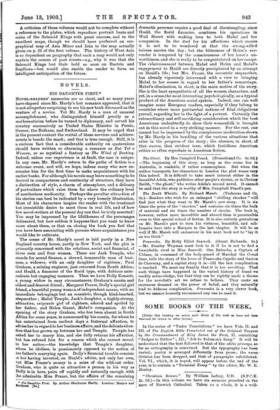NOVELS.
HIS DAUGHTER FIRST.* NOVEL-READERS' memories are so short, and so many years have elapsed since Mr. Hardy's last romance appeared, that it is not altogether surprising to see his new book discussed as the venture of a novice. Yet Mr. Hardy is a man of unusual accomplishment, who distinguished himself greatly as a mathematician before he turned to diplomacy, and served his country successively as United States Minister in Persia, Greece, the Balkans, and Switzerland. It may be urged that in the present context the recital of these services and achieve. ments is beside the mark; and that is true enough. Still, it is a curious fact that a considerable authority on quaternions should have written so charming a romance as But Yet a Woman, or so mystical a fantasy as The Wind of Destiny. Indeed, unless our experience is at fault, the case is unique. In any case, Mr. Hardy's return to the paths of fiction is a welcome event, and will, we hope, induce many who now en- counter him for the first time to make acquaintance with his earlier books. For although his novels may leave something to be desired in compactness and continuity of structure, they have a distinction of style, a charm of atmosphere, and a delicacy of portraiture which raise them far above the ordinary level of meritorious mediocrity. Perhaps the peculiar attraction of his stories can best be indicated by a very homely illustration. Most of his characters inspire the reader with the irrational but irresistible desire to meet them in real life, and of how few novel-writers at the present day can that be truly asserted ! You may be impressed by the lifelikeness of the personages delineated, but how seldom it happens that you want to know more about them, or that on closing the book you feel that you have been associating with persons whose acquaintance you would like to cultivate.
The scene of Mr. Hardy's novel is laid partly in a New England country house, partly in New York, and the plot is primarily concerned with the relations, social and financial, of three men and four women. These are Jack Temple, who stands for sound finance, a shrewd, honourable man of busi- ness, a widower, with an only daughter of eighteen ; Paul Graham, a mining engineer, just returned from South Africa; and Heald, a financier of the florid type, with dubious ante- cedents but engaging manners. Then we have Dolly Kensett, a young widow in easy circumstances, Graham's cousin and 'oldest and dearest friend ; Margaret Frazer, Dolly's special girl friend, a beautiful young woman of independent means, with no immediate belongings but an eccentric, though kind-hearted, stepmother ; Mabel Temple, Jack's daughter, a highly-strung, attractive, exigeante girl of eighteen, adored and spoiled by her father, and Helen Gaunt, Mabel's companion. At the opening of the story Graham, who has been absent in South .Africa for some years, is summoned by his cousin, for whom he has entertained from earliest days a fraternal affection, tc advise her in regard to her business affairs, and the delicate situa- tion that has grown up between her and Temple. Temple has asked her to marry him, and she fully returns his affection, but has refused him for a reason which she cannot reveal to her suitor,—the knowledge that Temple's daughter, whom he idolises, is passionately opposed to the notion of her father's marrying again. Dolly's financial trouble consists al her having invested, on Heald's advice, not only her own, but Miss Frazer's money in a mine of the wild-cat order. Graham, who is quite as attractive a person in his way as Dolly is in hers, pairs off rapidly and naturally enough with the admirable Miss Frazer, but the affairs of the remaining • Kis Daughter First. By Arthur Sherburne Hardy. London : Harper and Brothers. '[6a]
.dramatis personae require a good deal of disentangling, since Heald, the florid financier, combines his operations in Wall Street with making love to both Mabel and her companion. In the duel for his affections which ensues it is not to be wondered at that the strong-willed heiress carries the day ; but the bitterness of Helen's sur- render is tempered by the consciousness of her lover's un- worthiness, and she is really to be congratulated on her escape. The eelaireissement between Mabel and Helen and Mabel's engagement to Heald are directly precipitated by an attempt on Heald's life ; but Mrs. Frazer, the eccentric stepmother, has already vigorously intervened with a view to bringing Mabel to her senses in regard to her father's remarriage. Mabel's elimination, in short, is the main motive of the story. She is the least sympathetic of all the women characters, and yet, in a sense,the most interesting psychologically, as a typical product of the American social system. Indeed, one can well imagine some European readers, especially if they belong to countries where more patriarchal notions of filial obligations prevail, regarding her in the light of a portent. Certainly the extraordinary and self-sacrificing consideration which the best Americans undoubtedly do show their womenfolk is brought out in this novel in a very striking manner. For the rest, one cannot but be impressed by the conspicuous moderation shown by Mr. Hardy in his handling of the various situations that arise in the progress of the story ; the absence, in short, of that excess, that strident tone, which fastidious American critics so often reprobate in American fiction.










































 Previous page
Previous page